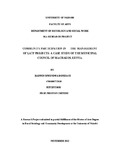| dc.contributor.author | Harwin, Boniface M | |
| dc.date.accessioned | 2013-02-26T06:22:17Z | |
| dc.date.issued | 2012 | |
| dc.identifier.uri | http://erepository.uonbi.ac.ke:8080/xmlui/handle/123456789/11270 | |
| dc.description.abstract | This study was conducted when Kenya was ushering in a new constitutional
dispensation. The constitution is currently being implemented and it embraces
people’s participation in local development by shifting power and initiatives from the
centre to the grassroots. This gave relevance to this study.
The main objective of the study was to evaluate community participation in the
management of LATF in Machakos Municipality.
Data were collected in Machakos Municipality using both qualitative and quantitative
methods of data collection and analysis. The methods and tools used to collect data
include questionnaires, key informants interviews guide and documentary review. The
data was analyzed and presented in the form of tables, pie charts and bar graphs.
The study found that the main occupation of Machakos Municipality residents were
traders and workers. A good number are self-employed and employed but
unemployment is still a major issue making the LATF projects of major significance
to the community.
There was gender representation in the management of the LATF projects. LATF
project committees were dominated by older men and hence there was need to push
the agenda of youth and women empowerment since they were the least in the
committees. Awareness of the LATF Act provisions was limited and there was no
adequate community participation in the management of LATF projects.
The study found that LATF had given overwhelming powers to politicians in the
management of the funds who determined the award of tenders which was
characterized by corruption.
The study’s recommendations are that: The LATF decision making process should be
open and the locals should be involved in its various steps. To foster transparency and
build confidence, there should be regular meetings to deliberate on the issues
affecting the LATF projects and chatting the way forward. There was need to promote
awareness on LATF and the overwhelming powers given to politicians under LATF
needed to be trimmed. | en |
| dc.description.sponsorship | The University of Nairobi | en |
| dc.language.iso | en | en |
| dc.publisher | The University of Nairobi | en |
| dc.subject | Community participation | en |
| dc.subject | Management of late projects | en |
| dc.subject | Municipal council of Machakos, Kenya | en |
| dc.title | Community participation in the management of late projects: A case study of the municipal council of Machakos, Kenya | en |
| dc.type | Thesis | en |
| local.publisher | Sociology | en |

